
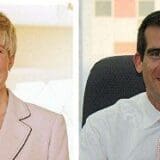
Update: KPPC FM’s Hayley Fox reports that L.A. City Councilwoman and mayoral candidate Jan Perry is also declining Walmart campaign funds.
Los Angeles’ two top mayoral candidates announced Thursday they will not accept campaign contributions from Walmart, which is locked in a battle with community and labor groups over the retail giant’s plans to open a 3300-square-foot grocery store in Chinatown.
The pledges by L.A. City Councilman Eric Garcetti and his chief opponent, City Controller Wendy Greuel, bring new focus to Saturday’s protest march and rally against Walmart. Both candidates have endorsed the June 30 action.
“Los Angeles loses if we run a race to the bottom in terms of wages and working conditions,” Garcetti said. “Our economy needs good middle class jobs to get back on track, and that’s what we should be working toward.”
The two candidates urged other elected politicians to also refuse money from Walmart.
» Read more about: Garcetti and Greuel Take the Pledge: No Walmart Money »
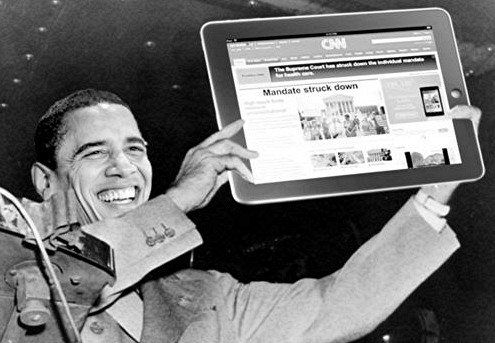

By a 5-4 vote, the U.S. Supreme Court has upheld most provisions of the Affordable Care Act. In the court’s most closely watched decision in decades, the majority ruled ACA’s provision mandating that individual citizens enroll in health-care programs was a constitutional imposition of a tax. On the other hand, the justices ruled against the expansion of Medicare.
A statement issued by California’s United Nurses Associations of California/Union of Health Care Professionals hailed the court’s decision. The statement quoted union Secretary-Treasurer Barbara Blake, RN:
“This is not just an abstract legal decision. Real lives and the heartbreak of real families will be saved because of it. We’ve got more people in California dying each year because they don’t have health insurance than any other state in the country. But thanks to the Affordable Care Act, the vast majority of us will be covered.”
See these stories:
New York Times (“HEALTH LAW STANDS”
Los Angeles Times (“Healthcare law upheld as a tax measure”)
Washington Post (“What the Supreme Court’s decision on the health-care law may mean for you”)
Talking Points Memo (“SUPREME COURT UPHOLDS ‘OBAMACARE’”
» Read more about: Split Court Vote Upholds Most of Affordable Care Act »


As thousands prepare to hit the streets of L.A.’s historic Chinatown on Saturday, June 30, for the largest protest against Walmart ever held in the U.S., several acclaimed musicians, including three Grammy winners, are joining the growing effort to stop the world’s largest retailer from opening in Chinatown and expanding across Los Angeles with poverty-level jobs and practices that hurt local businesses and communities. Musicians are also backing hundreds of Walmart workers who will march on June 30 to demand Walmart treat them with respect and provide wages that can support families.
Grammy Award-winning singer-songwriter, actor and author Steve Earle made a video from a recording studio in Nashville to support the march against Walmart in Los Angeles on June 30. After singing a few lines from his new song, Earle says, “If I wasn’t [in Nashville making a record] I would love to be in Chinatown,
» Read more about: Musicians Stand Up to Walmart in Los Angeles »


Walmart soon turns 50. What better time for a makeover, a little freshening up –a rebranding, perhaps? Maybe a new look to go along with a move from the ‘burbs to the Big City.
The Big W is hoping a fresh face will help as it moves to crack an urban market worth as much as $100 billion. Walmart has overbuilt in rural and suburban areas to the point of cannibalization, one Walmart Supercenter devouring the profits of the other. The loser is left to die—and the vacant space is left to whatever retailer can afford to move in (and is not a Walmart competitor) A PBS documentary reported in 2001 that Walmart had left behind more than 25 million square feet of unoccupied space across the country.
Walmart U.S President and CEO Bill Simon rolled out the makeover concept last year at the Bank of America Merrill Lynch Consumer Conference.
» Read more about: Walmart at 50: Still Greedy After All These Years »


 Last week the activist right-wing majority of the United States Supreme Court –in a radical departure from well-settled jurisprudence — further weakened the ability of labor unions to engage in meaningful political activity. The decision has been largely overshadowed by the Court’s ruling on Arizona’s S.B. 1070, and by its anticipated ruling on the Affordable Care Act. Yet, as far as the viability of the labor movement is concerned, the significance of this decision can scarcely be overstated.
Last week the activist right-wing majority of the United States Supreme Court –in a radical departure from well-settled jurisprudence — further weakened the ability of labor unions to engage in meaningful political activity. The decision has been largely overshadowed by the Court’s ruling on Arizona’s S.B. 1070, and by its anticipated ruling on the Affordable Care Act. Yet, as far as the viability of the labor movement is concerned, the significance of this decision can scarcely be overstated.
In Knox v. SEIU, Local 1000, the majority opinion displayed an unprecedented level of concern for the First Amendment rights of a minority of public-sector employees – but only insofar as those rights limit the ability of labor unions to speak politically. The case arose from SEIU’s state-wide response to several anti-union voter propositions in California. The initiatives were announced after the union had already determined and sent out notices for dues for the coming year.
» Read more about: Crass Warfare: Supreme Court Attacks Unions »

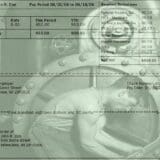
(This post first appeared on the Drucker Exchange, a daily blog produced by the Drucker Institute at Claremont Graduate University. It appears here with permission.)
The man who proved Karl Marx wrong was, according to Peter Drucker, American management expert Frederick Taylor.
Taylor had the insight that factory workers could be made more productive through improvements in technology and management—rather than merely through longer, harder hours. What’s more, those workers could share in the fruits of growth.
“Without Taylor, the number of industrial workers would still have grown fast, but they would have been Marx’s exploited proletarians,” Drucker wrote in The New Realities. “Instead, the larger the number of blue-collar workers who went into the plants, the more they became ‘middle class’ and ‘bourgeois’ in their incomes and their standards of living.”
For the past 30 years,
» Read more about: Stagnant Wages: Rich Man, Poor Man, Poorer Man »


The wealthiest Americans have a long-held delusion, passed along through their media outlets to the rest of us, that they pick up the bill for most of our country’s needs, and that middle-class public workers and unions benefit from their generosity. But facts, not emotions, are needed to provide the truth. And there are plenty of eye-opening facts that refute the far-right claims.
Fact #1: Government employees make up 16.7% of U.S. employees and receive 17.6% of the pay.
The public vs. private “who gets higher pay?” battle has convincing arguments on both sides. Yet a careful analysis of Census Department data confirms that government employees earn less than 1% more than private sector employees. Recent (2009) compensation figures reveal that:
» Read more about: Mythbusters: The Legend of Overpaid Public Workers »
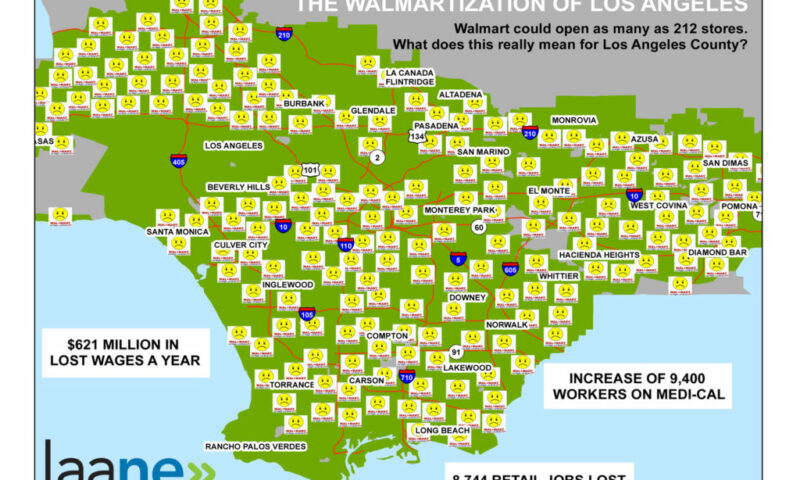
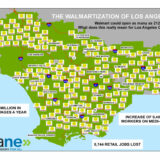
Maybe you will be one of the 10,000 people expected at a June 30th protest in L.A.’s Chinatown against a controversial plan to open a Walmart store there. The uber-retailer’s reputation for wrecking the atmosphere of historic districts like Chinatown, and posing a potential threat to local businesses, has generated strong resistance to plans for a 33,000 square-foot “express” Walmart at Cesar Chavez and Grand avenues.
The fight isn’t only about Chinatown–it’s about all of Los Angeles, because Walmart may be coming to a corner near you. Walmart has designs on locations around L.A. County to gain a foothold in the local urban grocery market.
The retailing behemoth needs to shore up sagging sales and stagnating stock prices, which requires expansion into U.S. urban markets. (Rural and suburban areas across the country have reached the Walmart saturation point.) But Walmart has encountered stubborn opposition in urban centers where residents take issue with its penchant for keeping its employees in low-wage,
Few American institutions have been subjected to such a consistent stream of vitriol and assault as the minimum wage, which celebrates its 74th birthday this week. The first federal minimum wage was established when FDR signed the Fair Labor Standards Act (FLSA) on June 25, 1938. The FLSA also established the eight-hour day, paid overtime and child labor protections into federal law. Since then, it has been amended nine times to expand coverage and to raise the wage to keep it in line with the nation’s economic growth.
Business leaders, industry associations, politicians and more recently think tanks have opposed the FLSA and every legislative amendment since. They said it would destroy American civilization, kill jobs and hurt black people. Business owners predicted they would be forced into bankruptcy.
One business opponent of the 1938 legislation even warned that the minimum wage would lead to the decline of the American empire.
» Read more about: Minimum Wage Doomsayers Still Wrong After 74 Years »